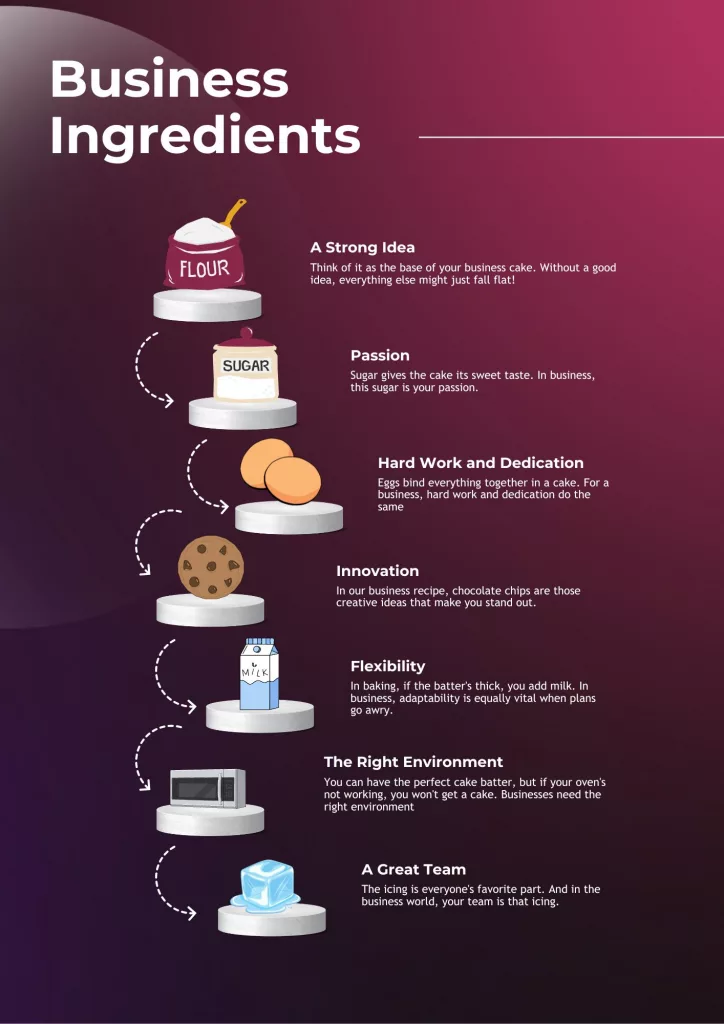Imagine you’re about to jump into a new video game, one you’ve never played before. It’s exciting, right? But just diving in without understanding the game can lead to surprises. Similarly, starting a business is an adventure full of surprises. An entrepreneur, like a gamer, must be prepared!
Starting a business isn’t just about having a cool idea. No, it’s much more than that. It’s about understanding risks, expecting the unexpected, and being ready to face challenges.
Imagine your favorite game’s toughest level. Entrepreneurs face those levels in real life! Before they even open shop, they must assume many things, just like a gamer assumes challenges in a new game. Curious about what these things are? Let’s dive deep and uncover the mysteries of starting a business!
Also Read: Outsourcing Marketing for Small Business
The Heart and Mind of an Entrepreneur

Imagine being on a thrilling rollercoaster ride, one moment you’re climbing high with excitement and the next, you’re rushing down filled with nerves. That’s the life of an entrepreneur! They’re adventurers, always on this exciting journey of ups and downs.
Heart: The Passionate Beat
Ever felt super excited about an idea? That’s the heart of an entrepreneur. It’s like:
- Loving a hobby so much, you can’t stop thinking about it.
- Being so into a video game, you play for hours. The heart of an entrepreneur is full of dreams, hope, and a lot of passion.
Mind: The Clever Thinker
Now, imagine planning a strategy to win that video game. That’s the entrepreneur’s mind. It’s sharp, always thinking of:
- Ways to turn dreams into real stuff.
- Smart plans to overcome challenges. It’s like being the captain of a team, leading everyone to victory.
Together: An Unstoppable Force
Put that heart and mind together, and what do you get? An unstoppable force! Someone who:
- Chases dreams with passion.
- Uses their clever mind to make it all work. Being an entrepreneur is like being a superhero. With the heart full of dreams and a mind full of plans, they’re ready to conquer the world!
Remember, every big idea starts with a single thought. So, think big, dream big, and who knows? You might just be the next big entrepreneur!
Ingredients for Business Success

Have you ever tried baking a cake? There’s flour, sugar, eggs, and maybe some chocolate if you’re feeling fancy. Each ingredient is essential. Just like making a perfect cake, building a successful business has its ingredients too! And guess what? I’m sharing the secret recipe with you today.
1) Flour: A Strong Idea
Every cake starts with flour, and every business begins with an idea. But not just any idea – a solid, unique, and exciting one. Think of it as the base of your business cake. Without a good idea, everything else might just fall flat!
2) Sugar: Passion
Sugar gives the cake its sweet taste. In business, this sugar is your passion.
- It’s the excitement you feel every morning.
- It’s the sparkle in your eyes when you talk about your plans.
- It’s what keeps you going even when things get tough.
If you’re not passionate about your business, it’ll taste bland, just like a cake without sugar!
3) Eggs: Hard Work and Dedication
Eggs bind everything together in a cake. For a business, hard work and dedication do the same. It’s all about:
- Putting in the hours.
- Learning from mistakes.
- And never, ever giving up.
Just as a cake won’t set without eggs, a business won’t succeed without some sweat and grit!
4) Chocolate Chips: Innovation
Who doesn’t love a surprise bite of chocolate in their cake? In our business recipe, chocolate chips are those creative ideas that make you stand out.
- Maybe it’s a new app feature.
- Or a unique way to package your product.
- Perhaps it’s a super cool advertising strategy.
Innovation is the fun, unexpected stuff that gets people talking about your business.
5) Milk: Flexibility
Sometimes, when you’re mixing the cake batter, it’s too thick. So, you add a splash of milk. Similarly, in business, you must be flexible. When things don’t go as planned:
- Adjust your strategy.
- Learn to adapt.
- Embrace change and go with the flow.
Being too rigid can break a business just like a too-thick batter can ruin a cake.
Also Read: 5 Business Processes to Automate to Speed up Your Workflow
6) Oven Heat: The Right Environment
You can have the perfect cake batter, but if your oven’s not working, you won’t get a cake. Businesses need the right environment:
- Supportive friends and family.
- A community that believes in you.
- Maybe even some mentors or advisors to guide the way.
7) The Icing: A Great Team
Let’s be honest: the icing is everyone’s favorite part. And in the business world, your team is that icing.
- People who share your vision.
- Team members who bring new skills and ideas.
- Folks who support and lift each other up.
The right team can turn a good business into a great one.
Starting a business is like baking a cake. Sure, it might be a bit tricky, and yes, you’ll probably make a few mistakes.
But with the right ingredients and a bit of love, you’re on your way to creating something super tasty.
So, preheat that oven and get baking… or in this case, start that business and watch it grow!
Happy baking… I mean, business-making!
Financial Assumptions

Imagine you’re planning a big road trip with friends. You map out where you’ll go, guess how much gas you’ll need, and budget for snacks. Starting a business is a lot like that. Only, instead of gas and snacks, you’re planning for money matters. And just like you’d guess how many snacks you’d munch on during the trip, an entrepreneur makes “financial assumptions.” Let’s dive into it!
What Are Financial Assumptions?
In simple words, financial assumptions are educated guesses. They’re like predicting how many cookies you’ll eat in a week. For a business, they’re about things like how much money it’ll make, or how much it’ll spend.
Why Are They Important?
Think about your road trip. What if you guessed wrong and ran out of gas? Oops! In business, wrong guesses can be tricky too. So, making good financial assumptions helps:
- Prepare for surprises
- Plan better
- Save money
1) Start-Up Costs: The First Guess
Every trip starts with packing. For a business, this is the initial cost or the “start-up” cost. Entrepreneurs assume:
- Rent: Where will your business live? A shop? An office? How much will it cost?
- Equipment: Things you need to start. Like a computer, furniture, or maybe an oven if you’re baking.
- Initial Stock: If you’re selling something, you need to buy it first.
2) Running Costs: Keeping the Car Moving
Once the road trip starts, there’s still gas, food, and maybe some fun stops. For a business, these are “running costs.” Regular expenses include:
- Monthly Rent: Your business home’s rent.
- Salaries: Paying the people who work with you.
- Bills: Electricity, water, and internet.
3) Income Predictions: Guessing the Goodies
On your trip, you might find coins on the way or get gifted some candy. For a business, this is income or money coming in. Entrepreneurs guess:
- How many products they’ll sell.
- The price for each product.
- How often people will buy.
4) Safety Net Assumptions: For Rainy Days
Sometimes, trips have rainy days. Or a flat tire. Businesses have unexpected problems too. So, entrepreneurs assume:
- Emergency Funds: Money saved for surprise problems.
- Insurance: Like a safety net, catching you if things go wrong.
5) Growth Predictions: Dreaming Big
Every road trip ends, and you plan the next one, hoping it’s longer and cooler. Entrepreneurs dream about their business growing. They guess:
- Expanding: Opening more shops or selling in more places.
- Hiring More People: To help with the extra work.
- New Products: Creating new things to sell.
Just like guessing how many candies you’ll need for a week, financial assumptions help plan and protect a business. They’re the entrepreneur’s tool to dream, decide, and defend their business baby. So next time you’re guessing your weekly candy stash, think of yourself as a mini-entrepreneur!
Expect the Unexpected

Starting a business is like embarking on a journey filled with unexpected twists and turns. To be successful, an entrepreneur must be prepared to face unforeseen challenges and adapt to new circumstances. Here are some key areas to focus on:
1) Market Changes
- Dynamic Trends: Markets are always changing. Products or services that are in high demand today might not be as popular tomorrow.
- Emergence of Competitors: No matter the industry, new competitors can pop up at any time, possibly offering similar services or products at different prices.
- Shifts in Consumer Behavior: The way consumers think, buy, and engage can shift due to a variety of factors, such as cultural or technological changes.
Key Takeaway: Constantly monitor the market to stay updated. Adaptation is the key to staying relevant.
2) Challenges in Growth
- Resource Allocation: Growing a business means you’ll likely need more of everything – from staff to infrastructure. Balancing these needs can be challenging.
- Decision-making: As businesses expand, the decisions that need to be made become more multifaceted and critical.
- Maintaining Quality: Ensuring that the quality of your product or service remains consistent while scaling up is paramount.
Crucial Point: Growth should be managed strategically. Planning and foresight can help navigate the complexities that arise with expansion
Starting a business requires resilience, adaptability, and a readiness to face the unknown. By staying vigilant about market changes and being prepared for the challenges in growth, entrepreneurs can better position themselves for long-term success.
In the business world, the only constant is change. Embrace it, and let it drive your entrepreneurial journey forward.
Team Dynamics and Leadership

Starting a business is not just about having a great idea. It’s about nurturing a team and steering them with efficient leadership. In the early stages of your venture, understanding team dynamics and offering empathetic leadership is key. Here’s why.
Building a Strong Team
- Foundation: Before you even think about products or services, your first priority is to build a solid team. This group will be the backbone of your business.
- Selection: Choose members who not only have the required skills but also gel well with the team’s values and goals.
- Clear Roles: Clearly define everyone’s responsibilities. When every member knows their part, there’s less overlap and more efficiency.
- Open Communication: Foster an environment where members can freely voice their opinions or concerns. This prevents misunderstandings and conflicts.
- Respect and Trust: Once your team is in place, invest in earning their trust.
- Reliability: Be consistent in your actions and decisions. This makes you a predictable and trusted leader.
- Acknowledge Efforts: Recognize the hard work your team puts in. A little appreciation goes a long way in building loyalty.
Leading with Empathy
- Understand their World: To truly lead, one must first understand.
- Listen Actively: Hear out your team members. Understand their challenges and aspirations. This helps you make informed decisions.
- Flexibility: Understand that every team member has a life outside work. Accommodate their needs when possible, and they’ll be more committed when at work.
- Be Their Guide: An empathetic leader does not just command; they guide.
- Feedback over Criticism: Instead of just pointing out what’s wrong, provide constructive feedback. This encourages growth and improvement.
- Open Door Policy: Let your team know that they can approach you with any concerns. This transparency fosters a sense of security.
As an entrepreneur, your role isn’t limited to just running a business. You’re shaping a culture, a work environment, and ensuring the professional growth of your team. By focusing on team dynamics and leading with empathy, you’re laying the foundation for a thriving, resilient, and harmonious business.
Remember, businesses may be built on ideas, but they’re powered by people. Treat them right.
Also Read: Five tips for startups to reduce costs in 2023
Legal and Ethical Considerations

Before starting a business, you should be aware of certain legal and ethical considerations. This isn’t just about making money; it’s also about doing the right thing. Let’s dive in!
Know the Laws
- Licenses and Permits: Before you begin, know which licenses or permits you need. Every business has different requirements.
- For example, a restaurant may need health permits, while a tech start-up might not.
- Taxes: Yep, no one loves them, but we all have to pay them.
- Understand the different types of taxes – income, sales, property, and more.
- Keep clean records. This helps when tax season comes around.
- Employee Rights: If you hire people, you must treat them fairly.
- Understand minimum wage laws, overtime, and leave benefits.
- Protect your employees. Make sure the workplace is safe.
Ethical Choices
Doing the legal thing is important, but doing the right thing is equally crucial. Here’s where ethics comes into play.
- Honesty:
- Always be truthful in advertising and with customers. Don’t make false claims about what your product can do.
- Fairness:
- Treat all customers and employees equally. No discrimination. Everyone deserves respect.
- Environment:
- Care for our planet. Reduce waste, recycle when possible, and consider the environment in your business decisions.
- Community:
- Give back. Support local charities or initiatives. Businesses can help make the community better.
Final Words
The journey of entrepreneurship is thrilling, challenging, and rewarding, all at once. By preparing your mind, gathering the right tools, and assuming various roles and challenges, you’re setting your ship on a path to discover incredible treasures.
As you embark on this adventure, remember to stay curious, brave, and compassionate. The seas of business await your voyage!
FAQs
Research your idea, identify your target audience, and create a solid business plan.
It depends on your location and industry. Always check local regulations to ensure compliance.
This varies based on the business type. It’s essential to calculate startup costs and have a financial cushion for unexpected expenses.
Each structure has its benefits and drawbacks. Consider factors like liability, taxation, and business size. Consulting with a legal expert can help.
Options include personal savings, bank loans, angel investors, crowdfunding, or venture capital, depending on the scale and potential of your business.










Leave a Reply